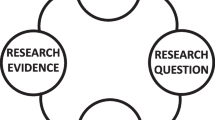Abstract
The deep/surface metaphor attacked by Webb (1997) is defended here interms of its validity as a description of important differences in the waysin which students learn, and also on the basis of the encouragement it hasbrought to academic staff to teach in more effective and imaginative ways.Post-modern theories which endorse extreme relativism are not seen as helpfulto the main concerns of either academic staff or educational developers.
Similar content being viewed by others
References
Biggs, J.B. (1993). 'What do inventories of students' learning processes really measure? A theoretical review and clarification', British Journal of Educational Psychology 63: 3–19.
Entwistle, N.J. (1995) 'Frameworks for understanding as experienced in essay writing and in preparing for examinations', Educational Psychologist 30: 47–54.
Entwistle, N.J. (1997) 'Contrasting perspectives on learning', in F. Marton, D.J. Hounsell and N.J. Entwistle (eds.), The Experience of Learning (2nd edn.). Edinburgh: Scottish Academic Press}.
Entwistle, N.J. (in press). 'Improving teaching through research on student learning', in J.J.F. Forest (ed.), University Teaching: International Perspectives. New York: Garland.
Gibbs, G. (1992). Improving the Quality of Student Learning. Bristol: Technical & Educational Services.
Janssen, P.J. and Meyer, J.H.F. (1996). 'Individual diversity in effective studying', Higher Education 31(1) (whole issue).
Laurillard, D.M. (1993). Rethinking University Teaching: a Framework for the Effective Use of Educational Technology. London: Routledge.
Marton, F. (1981). 'Phenomenography: describing conceptions of the world around us', Instructional Science 10: 177–200.
Marton, F., Hounsell, D.J. and Entwistle, N.J. (1984), (eds.), The Experience of Learning (2nd edn., 1997), Edinburgh: Scottish Academic Press.
Marton, F. and Säljö, R. (1976). 'On qualitative differences in learning. I-Outcome and process', British Journal of Educational Psychology 46: 4–11.
Parlett, M.R. and Hamilton, D. (1977). 'Evaluation as illumination: a new approach to the study of innovatory programmes', in D. Hamilton et al. (eds.) Beyond the Numbers Game. Basingstoke: Macmillan.
Perry, W.G. (1970). Forms of Intellectual and Ethical Development in the College Years: a Scheme. New York: Holt, Rinehart & Winston.
Prosser, M., Trigwell, K. and Taylor, P. (1994). 'A phenomenographic study of academics' conceptions of science learning and teaching', Learning and Instruction 4: 217–232.
Ramsden, P. (1992). Learning to Teach in Higher Education. London: Kogan Page.
Trigwell, K. (1995). 'Increasing faculty understanding of teaching', in W.A. Wright (ed.) Successful Faculty Development Strategies. New York: Anker.
Webb, G. (1997). 'Deconstructing deep and surface: Towards a critique of phenomenography', Higher Education 33: 195–212.
Author information
Authors and Affiliations
Rights and permissions
About this article
Cite this article
Entwistle, N. Reconstituting approaches to learning: A response to Webb. Higher Education 33, 213–218 (1997). https://doi.org/10.1023/A:1002930608372
Issue Date:
DOI: https://doi.org/10.1023/A:1002930608372




